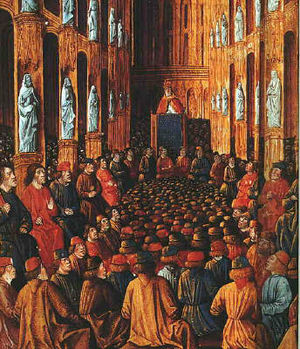 One of the reasons there are so many Protestant denominations is that they don’t recognize a common authority beyond Scripture. The problem with that is simple: whose interpretation is correct? When we look at the varied beliefs of Christians and the doctrines that are contentious (infant baptism, baptismal regeneration, the nature of justification, salvation, divorce and remarriage), it’s sometimes difficult to wonder how they can all claim to be within the same religion.
One of the reasons there are so many Protestant denominations is that they don’t recognize a common authority beyond Scripture. The problem with that is simple: whose interpretation is correct? When we look at the varied beliefs of Christians and the doctrines that are contentious (infant baptism, baptismal regeneration, the nature of justification, salvation, divorce and remarriage), it’s sometimes difficult to wonder how they can all claim to be within the same religion.
When Luther broke with the Catholic Church, he expected most believers to follow him and that would have been that. No one was supposed to break from him, and in fact, he anticipated mass conversions of Jews to his purified Christianity.
What he got instead was not a reformed church but reformed churches.
What’s more, he set a precedent: when one claims that the Bible alone is one’s authority, then one necessarily and inescapably adds one’s interpretation into the mix. Sola scriptura might more accurately be “by scripture and interpretation alone” (try as I may, I can’t figure out what that would be in Latin). Without an authority to determine which interpretation is appropriate and which is not, we’re lost. To suggest, as some do, that the Bible somehow interprets itself doesn’t solve the problem at all, for any and all reading requires interpretation. To read is to interpret, and to read one part of a text in order to interpret another part doesn’t magically lift us out of the interpretation quagmire.
The Catholic Church, though, claims to have that authority. Other groups do as well, to be sure, but not many other groups can trace their history back as far as the Church. Not many other groups can claim to have made the decisions about which books and epistles to include in the canonization process and which to exclude. Not many other groups can claim an unbroken line of successive authority back to 32 AD.
0 Comments